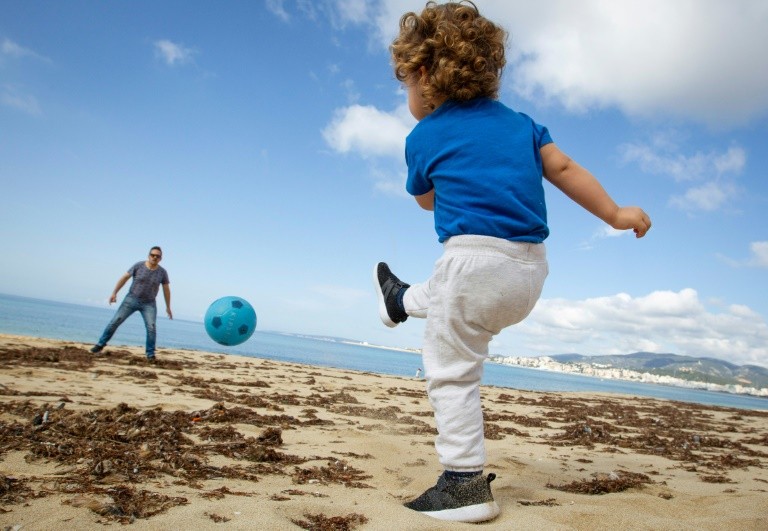Europe’s hardest-hit countries reported promising drops in coronavirus daily death tolls on Sunday, as governments around the world started peeling back lockdown measures in a bid to restore normal life and resuscitate crippled economies.
Children in Spain were allowed outside for the first time in six weeks on Sunday, while hairdressers and other shops are set to reopen in Switzerland this week.
Badly-hit Italy said many businesses would be able to resume next week and France planned to announce how it would start the slow crawl back to normality.
And in the US state of Georgia, a loosening of lockdown rules prompted beach gatherings at the weekend.
Leaders around the world are seeking to gradually reverse lockdowns while avoiding a dreaded second wave of infections amid warnings from the World Health Organization that recovered people might not be immune to reinfection.
The coronavirus pandemic has forced more than half of humanity into lockdown, upending life as we know it and tipping the global economy toward a recession not seen in decades.
Close to 203,000 people have died from the virus since it first emerged in China in December — well over half in Europe — and more than 2.9 million cases have been recorded, according to an AFP tally.
But Europe’s worst-hit countries — Italy, Spain, France and Britain — all reported drops in daily fatality rates Sunday, a sign the peak of the weeks-long crisis may have passed.
Britain’s daily tally was the lowest since March 31, while Italy and Spain’s were the lowest in a month. France’s toll was a drop of more than a third on the previous day’s figures.
The numbers came in as Spanish families embraced new rules allowing children outside for the first time since mid-March, with kids hopping on bicycles and scooters on the streets of Madrid — some wearing small masks and gloves.
“They are super excited, very, very impatient. They were up at 6:30 am, saying ‘We are going out, We are going out!’,” Inmaculada Paredes told AFP, readying to take her seven- and four-year-old kids outdoors.
Six-year-old Ricardo said it was “very good” to be out after a runaround with his younger sister in the city.
“We played hide and seek, we raced. We found a ladybug that was lost and we put it in among the ants,” he told AFP.
Under the revised rules, children are allowed out once per day between 9:00 am and 9:00 pm, but cannot venture more than one kilometre (0.6 miles) from their homes.
With more than 23,000 fatalities, Spain has the third highest death toll in the world after Italy’s 26,000 and more than 53,000 in the United States.
– ‘Pay the bills’ –
Other countries across Europe are also starting to look toward a gradual easing of their confinement rules.
In Switzerland, hairdressers, massage parlours, florists and garden centres were among some businesses allowed to reopen come Monday.
“It’s super,” said Florian, a barbershop manager in Lausanne.
“We have to start paying the bills,” he said, adding that hairdressers would wear masks and customers would be asked to wait outside instead of in the lounge.
France, Italy, Germany and Brussels are also looking at starting to lift weeks-old shut-in measures that have ground life to a halt for weeks on end and prompted dire predictions of a major economic slump.
Meanwhile, Saudi Arabia on Sunday said it would partially lift its 24-hour curfew, allowing malls and retailers to open their doors during certain hours.
But the kingdom said it would maintain a round-the-clock lockdown in the Muslim holy city of Mecca.
Worshippers in the country joined hundreds of millions of Muslims around the world who marked the second day of Ramadan at home, avoiding traditional, large family meals to break their day-time fasts under social distancing rules.
Rejecting the advice of top disease experts, the US state of Georgia allowed thousands of businesses to resume operations, from hairdressers to bowling alleys.
“How long are we supposed to imprison ourselves?” said 30-year-old Mackenzie Scharf, one of many in Georgia embracing the return to something resembling normalcy.
US President Donald Trump has repeatedly said he wants to resume business in the world’s biggest economy, even as medical advisors have cautioned against easing lockdown too soon or too fast.
The US leader faced a fresh volley of criticism after suggesting that coronavirus could be treated by shining ultraviolet light inside patients’ bodies, or with injections of household disinfectant.
He lashed out at the media on Twitter, accusing journalists of posing hostile questions, and suggested his daily coronavirus briefings were not worth his time.
“They get record ratings, & the American people get nothing but Fake News. Not worth the time & effort!,” Trump wrote.
– Immunity warning –
While cases and deaths plateau, the world remains in wait as companies and governments race to develop treatments and, eventually, a vaccine for the virus.
Some governments are studying measures such as “immunity passports” as one way to get people back to work after weeks of shutdowns that have roiled the global economy.
“If I’ve already had corona then I’m not infectious,” said Berlin resident Lothar Kopp, hoping to test positive for antibodies as it could allow him to visit his elderly mother.
But the WHO warned that people who survive infection cannot be certain they will not be hit again by the respiratory disease, which first emerged in China late last year.
“There is currently no evidence that people who have recovered from #COVID19 and have antibodies are protected from a second infection,” the UN health body said in a statement.
Several countries, including France and Germany, are planning to introduce coronavirus tracing apps to alert users if they are near someone who has tested positive.
The technology has already rolled out in Australia, sparking privacy concerns, and has been widely used in Singapore too.
AFP
